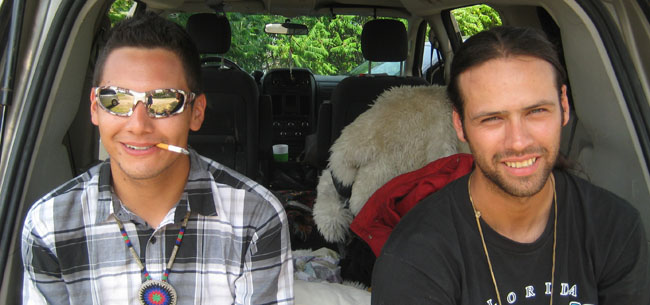Walking to honour the water

By Suzanne Keeptwo
Josephine Mandamin from Wikwemikong Unceded Indian Reserve has been walking in honour of water, accompanied by other Anishinaabe women, since touring around Lake Superior in 2003. Since then, the women have completed an annual walk to honour each of the Great Lakes and up the Saint Lawrence Seaway. This summer, they started walking over 2,000 km of the Migration Trail of their Anishinabek ancestors in the Gaspe Peninsula (Mantane, QC) and are expected to reach Madeline Island, Wisconsin by mid September.
The women walk to raise awareness about Mother Earth’s blood waters violated by chemicals, vehicle emissions, sewage systems, agricultural practices and landfill sites. They adhere to Ojibwe ceremonial understandings of water and protocols. Men hold the eagle staff and serve to protect the women as they walk. The women share the responsibility of carrying a “granny pail” holding about two litres of water they collect as they go, stopping at each lake, stream or tributary to offer tobacco, and fill then release the precious liquid along the way. Only women carry the water, as women carry Life.
Humans can live without food for about three weeks but, without water, one would die within a few days. It fuels our very existence. Every living cell in our bodies needs water to keep us functioning. Water covers over 70% of our Earth’s surface with 98% of it salt water unfit for consumption or irrigation. Just 2% is fresh water and over 1.5% of that is in ice caps and glaciers meaning limited freshwater is available from lakes, rivers, groundwater and wells. These waters are increasingly endangered.
The Sacred Water Walk 2015 aims to raise awareness of destructive impacts such as oil spills and train derailments that cause great harm to our waterways. Bathroom sink disposal of prescription drugs and personal-care products (hair colour, shampoo, etc.) are to blame for many of the chemicals found in analyzed water samples. Fats, oils and greases poured down the kitchen drain clog pipes and can cause sewage system backups that cause health hazards and threaten the environment. “Mother Earth is hurting. We can see evidence of this all around the world,” says Nokomis Josephine.
All Water Walks are spiritual as well as physical journeys, calling our attention to the need to take care of the water, to help our Mother struggling to survive and provide for her children. Each step is in prayer for the water, for animals, birds, insects, trees, and for us, the two- legged. We Are All Connected.
The Water Walkers welcome anyone to join them, especially men of which there are typically few, to keep the balance.
“I get inspiration from Grandma,” says Nelson Footman from Rainy River First Nation who is one of only three men including a three year-old boy who has been with the group since the start of the journey.
If you would like to join along the route – for however long or short a time – or assist by offering accommodation or donations of food, gas, etc. please visit www.waterwalkersunited.com
Suzanne Keeptwo is a freelance writer residing in unsurrenderd Algonquin territory
HONOUR & PROTECT OUR WATER!
Things to never wash down your toilet, bathroom or kitchen drain:
- Fats, oils or grease from cars or lawnmowers
- Coffee grinds
- Egg shells
- Produce stickers
- Chunks of garbage
- Feminine hygiene products
- Paper towels
- Flushable cat litter
- Rags
- Condoms
- Motor oil, transmission fluids, anti-freeze or other toxic chemicals
- Solvents, paints, turpentine, nail polish, polish remover
- Flammable or explosive substances
- Corrosive substances that are either acidic or caustic
- Prescription and over-the-counter medications


